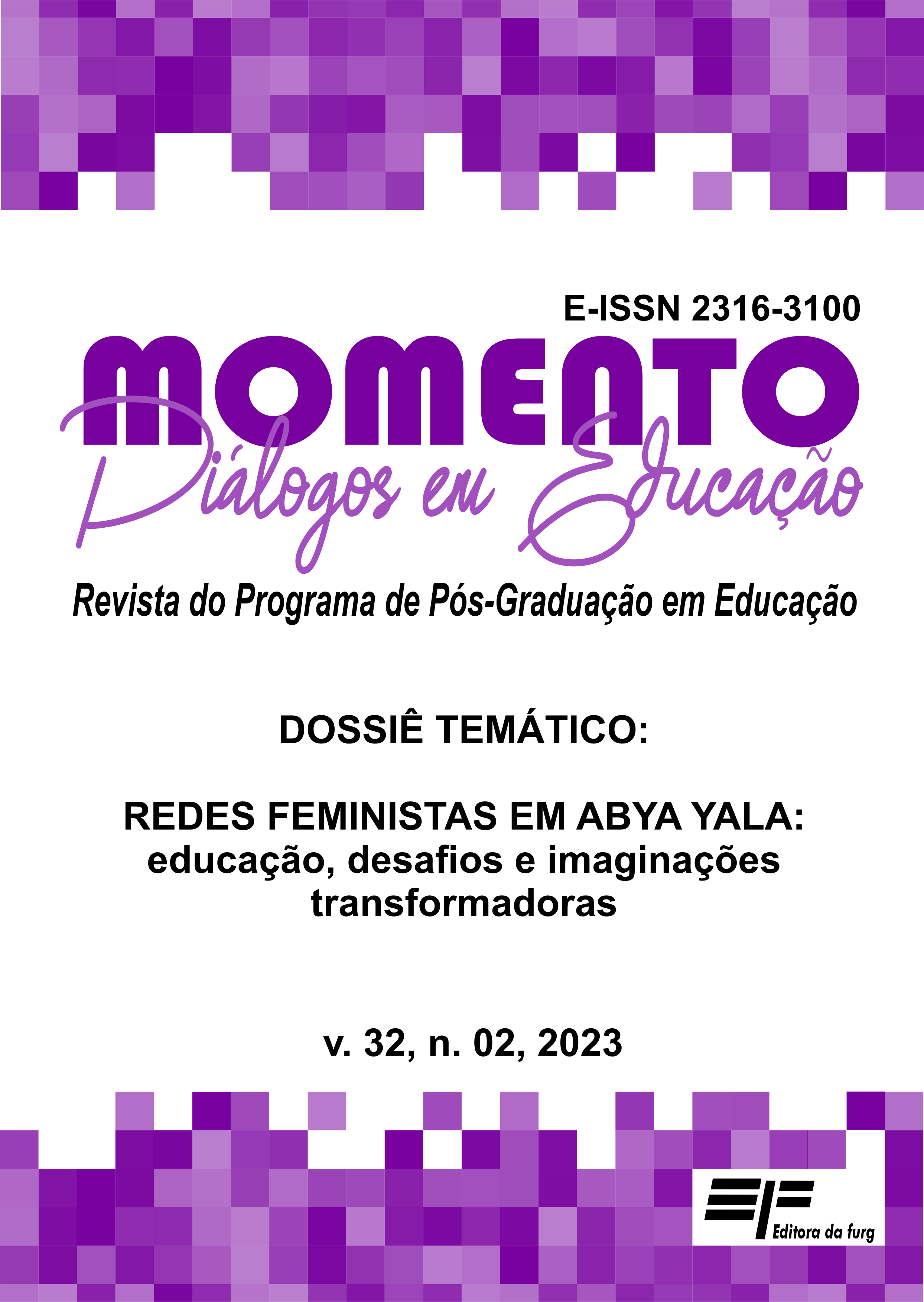ROLE PLAYING GAME NA EDUCAÇÃO BRASILEIRA
uma revisão sistemática
DOI:
https://doi.org/10.14295/momento.v32i02.14135Palavras-chave:
Educação, Práticas de Ensino, Jogos de SimulaçãoResumo
O presente estudo representa uma revisão sistemática da literatura acerca do uso do Role-Playing-Game (RPG) na educação brasileira enquanto ferramenta de ensino e intervenção. Os artigos coletados foram classificados levando em consideração as características dos participantes dos estudos e ambiente de aprendizagem, variáveis independentes e dependentes e, por fim, resultados e fatores relacionados. A partir dos resultados obtidos, discutem-se as potencialidades do RPG enquanto forma de intervir em processos de ensino e do desenvolvimento de habilidades específicas. Além disso, são apresentadas e discutidas as limitações da ferramenta, principalmente com relação a aplicabilidade pedagógica. São levantadas hipóteses e interpretações com relação aos dados apresentados, tendo como base a teoria sócio-histórica.
Downloads
Referências
BLACKMON, Wayne. Dungeons and dragons: The use of a fantasy game in the psychotherapeutic treatment of a young adult. American Journal of Psychotherapy, Washington D.C., v. 48, n. 4. fev. p. 624-632. 1994.
EDITORA JAMBÔ. O que é Tormenta. [S.I] 2019. Disponível em: <https://tormentarpg.com.br/> Acesso em: 14 jan. 2020.
FERREIRA-COSTA, R.; LIMA, A.; RODRIGUES, F.; & GALHARDO, E. O Role Playing Game (RPG) como ferramenta de aprendizagem no ensino fundamental e médio. São Paulo. 2007. Recuperado em 14 mar. 2020. Disponível em:
http://www.unesp.br/prograd/PDFNE2006/artigos/capitulo1/oroleplayingame.pdf
GADOTTI, Moacir. Perspectivas atuais da educação. São Paulo em Perspectiva, São Paulo, v. 14, n. 2, p. 03-11, 2000.
GRANDO, Anita; TAROUCO, Liane. O uso de jogos educacionais do tipo RPG na educação. Novas tecnologias na educação, Porto Alegre. v.6, n.2. dez. p. 01-10. 2008.
INSTITUTO NACIONAL DE ESTUDOS E PESQUISAS EDUCACIONAIS ANÍSIO TEIXEIRA (INEP). Pisa 2018 revela baixo desempenho escolar em leitura, matemática e ciências no Brasil. Publicado em 03 de dezembro de 2019 e disponível em: <http://portal.inep.gov.br/artigo/-/asset_publisher/B4AQV9zFY7Bv/content/pisa-2018-revela-baixo-desempenho-escolar-em-leitura-matematica-e-ciencias-no-brasil/21206>. Acesso: 06 de novembro de 2020.
KUITTINEN, Petri. Very Important Game People in the History of Computer and Video Games. 2006. 212 f. Dissertação (Mestrado em Artes) - University of Art and Design of Helsinki. 2006.
LEONTIEV, Alexis. Os princípios psicológicos da brincadeira pré-escolar. In: VIGOTSKI, Lev.; LURIA, Alexander.; LEONTIEV, Alexis. Linguagem, desenvolvimento e aprendizagem. Editora ícone, São Paulo (16ª ed.), p. 119-142. 2019.
LURIA, Alexander. O desenvolvimento da escrita na criança. In: VIGOTSKI, Lev.; LURIA, Alexander.; LEONTIEV, Alexis. Linguagem, desenvolvimento e aprendizagem. Editora ícone, São Paulo (16ª ed.), p. 143-190. 2019.
NASCIMENTO, Carolina P.; ARAUJO, Elaine S.; MIGUÉIS, Marlene R. O jogo Como Atividade: Contribuições da teoria histórico-cultural. Rev Psicol Esc Educ. São Paulo. v. 13, n. 2. jul/dez. 2009.
PAIVA, Marlla R.F.; PARENTE, José R.F.; BRANDÃO, Israel R.; QUEIROZ, Ana H.B. Metodologias ativas de ensino-aprendizagem: revisão integrativa. Sanare. v. 15, n. 2, p. 145-153. jun/dez. p. 293-302. 2016.
PINHEIRO, Silvia N.S.; DAMIANI, Magda F.; SILVA JUNIOR, Bento S. da. O Jogo com Regras Explícitas Influencia o Desenvolvimento das Funções Psicológicas Superiores? Psicol. Esc. Educ., Maringá, v. 20, n. 2, p. 255-264. mai/ago. 2016.
PRENSKY, Marc. Digital Game-Based Learning. McGraw-Hill, 2001
PRIOSTE, Cláudia. Hipóteses docentes sobre o fracasso escolar nos anos iniciais do Ensino Fundamental. Educ. Pesqui., São Paulo, v. 46, n. 1, p. 01-20. 2020.
RANDI Marco A.F.; CARVALHO Hernandes F. Aprendizagem através de Role-Playing Games: uma abordagem para a educação ativa. Revista Brasileira de Educação Médica, v. 37, n. 1. p. 80-88. fev. 2013.
REGO, Teresa C. Vygotsky: Uma perspectiva histórico-cultural da educação. (15° ed) Petrópolis: Vozes, 2003.
SANTOS, Josineide A.; DE ROSE, Júlio. C. A importância do reforço natural na formação do hábito de leitura. Revista Olha - UFSCar, São Carlos. v. 2, n. 1. dez. p. 1-6. 1999.
SANTOS, Josineide A.; DE ROSE, Júlio. C. Interesse de Crianças por Leitura: Um Procedimento para Identificar o Valor Reforçador Relativo de Atividades. Acta Comportamentalia, v. 8, n. 1. dez. 2000.
AUTOR. 2019.
VIGOTSKI, Lev S. Imaginação e criatividade na infância. (1ª ed). São Paulo, Editora WMF Martins Fontes. 2014.
VIGOTSKI, Lev S. A formação social da mente. (7ª ed.). São Paulo: Martins Fontes. 2007.
VYGOTSKY, Lev S. Play and its role in the Mental Development of the Child. Psychology and Marxism Internet Archive (marxist.org). 2002. Recuperado: 14 mar. 2020. Disponível em:
https://www.marxists.org/archive/vygotsky/works/1933/play.htm
Downloads
Publicado
Como Citar
Edição
Seção
Licença
Copyright (c) 2023 Momento - Diálogos em Educação

Este trabalho está licenciado sob uma licença Creative Commons Attribution 4.0 International License.
À Revista Momento − Diálogos em Educação, ficam reservados os direitos autorais, de todos os artigos nela publicados.


